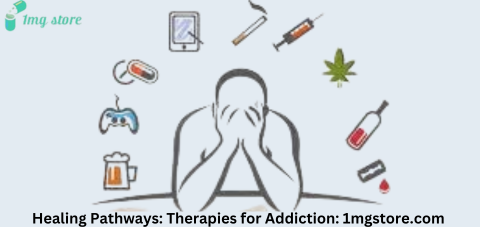
Addiction
Addiction is a complex and chronic medical condition characterized by the compulsive use of substances or engagement in behaviors despite adverse consequences. It is often associated with a loss of control, continued use despite harm, and a strong, sometimes overwhelming, craving for the substance or behavior. Addiction can impact various aspects of an individual's life, including physical health, mental well-being, relationships, and overall quality of life.
Key Aspects of Addiction:
Substance Addiction:
- Common Substances: Addiction can involve substances such as alcohol, nicotine, prescription medications, and illicit drugs like cocaine, heroin, or methamphetamine.
- Impact on the Brain: Substance addiction often involves changes in the brain's reward system, leading to heightened cravings and dependence on the substance.
Behavioral Addiction:
- Examples: In addition to substance addiction, individuals can develop addiction-like behaviors related to activities such as gambling, gaming, shopping, or excessive use of the internet.
- Reward Pathways: Behavioral addictions also affect the brain's reward pathways, contributing to compulsive engagement in the behavior.
Psychological Factors:
- Underlying Issues: Addiction is often linked to underlying psychological factors, such as trauma, stress, mental health disorders, or a history of adverse experiences.
- Coping Mechanism: Substance use or addictive behaviors may serve as coping mechanisms to deal with emotional pain or distress.
Physical Dependence and Withdrawal:
- Physical Adaptation: Continued substance use can lead to physical dependence, where the body adapts to the presence of the substance, and withdrawal symptoms occur upon cessation.
- Withdrawal Symptoms: Withdrawal symptoms can vary depending on the substance but may include nausea, sweating, anxiety, and irritability.
Impact on Relationships:
- Strained Relationships: Addiction often strains relationships with family, friends, and colleagues due to the behavioral changes, unreliability, and trust issues associated with the condition.
- Isolation: Individuals with addiction may isolate themselves, further exacerbating social and emotional challenges.
Treatment and Recovery:
- Multifaceted Approach: Successful addiction treatment typically involves a multifaceted approach, combining behavioral therapies, counseling, support groups, and, in some cases, medications.
- Relapse Prevention: Long-term recovery often requires ongoing support, relapse prevention strategies, and addressing underlying psychological factors.
Stigma and Misconceptions:
- Stigmatization: Despite progress in understanding addiction as a medical condition, there is still stigma associated with it, leading to discrimination and barriers to seeking help.
- Educational Efforts: Education and awareness campaigns aim to dispel misconceptions surrounding addiction, emphasizing its neurobiological basis and the potential for recovery.
Public Health Impact:
- Epidemic Concerns: The rise of opioid addiction has led to public health concerns, prompting efforts to address the opioid epidemic and improve access to addiction treatment and prevention.
Conclusion:
Addiction is a multifaceted and challenging condition that affects millions of individuals globally. Recognizing it as a medical issue, understanding its underlying factors, and promoting compassionate and evidence-based approaches to treatment are essential steps toward addressing the complexities of addiction and supporting individuals on the path to recovery. Public awareness, education, and destigmatization efforts play a crucial role in fostering a more supportive and empathetic society for those affected by addiction.


